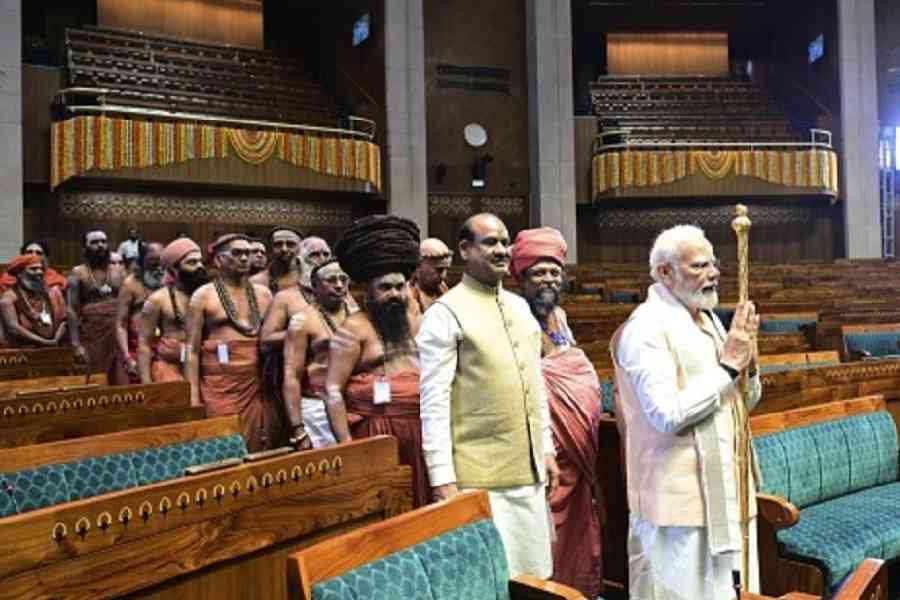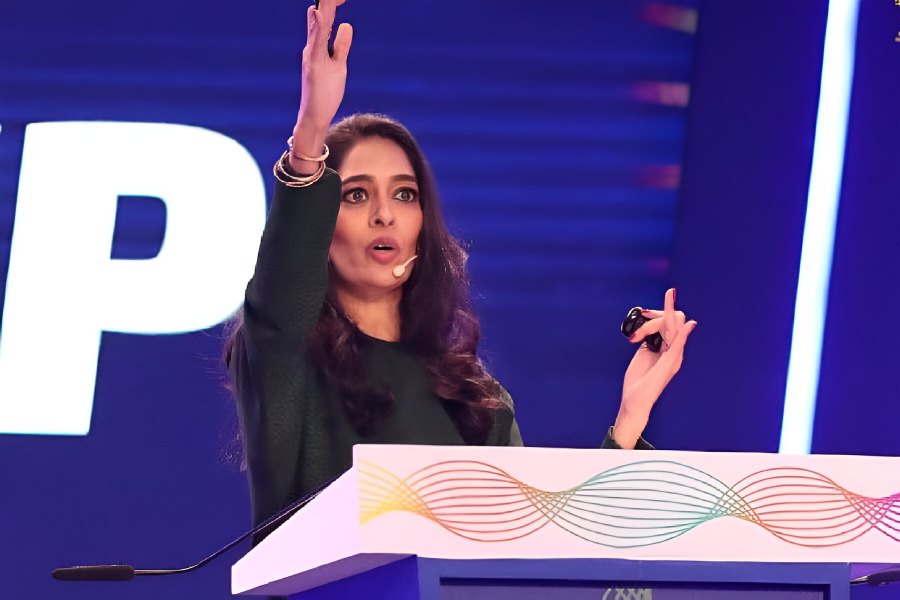A chaplain who was asked to pray for the new Congress in the United States of America replied that after seeing the legislators, he would rather pray for the people. That might also be said of other nations over which loom showmen like Silvio Berlusconi, Donald Trump or Boris Johnson “strik[ing] at the heart of the bond of trust and respect between the public and parliament that underpins” democracy, as Britain’s former prime minister, Theresa May, reminded the House of Commons during the historic debate on June 19.
It was historic as well as uplifting because in not many presumed democracies would an all-party parliamentary privileges committee unanimously produce a 30,000-word, 108-page report damning a prime minister with a handsome majority. Nor would the 354 members (out of a total of 649) who voted for the ‘Partygate’ report, impugning the “legality of activities in 10 Downing Street and the Cabinet Office under Covid regulations”, have included 118 ruling party members. Only seven voted against the report. May’s strictures and pieties might be attributed to the desire for vengeance against Johnson who led the 2019 revolt against her. But what she told the Commons underscored the accountability that lies at the heart of the difference between the British prototype and emulations masquerading as the “mother of democracy”.
The voting confirmed that most British members of Parliament are convinced that Johnson cared nothing for the institution. Like John Profumo who had to resign 60 years ago for lying to Parliament, Johnson was convicted of misleading the Commons. If he hadn’t quit before the debate, he would have been suspended for 90 days. As it is, he can’t set foot in Westminster. Not that his successor came out well either. Speaker after speaker condemned what the mass circulation Evening Standard called Rishi Sunak’s “dismal act of cowardice” in giving the debate a miss. He suffered a further setback when England’s three-judge appeal court banned the government’s multimillion-pound plan to forcibly send asylum seekers to Rwanda since the African republic might deport them to the country they had fled and where they could be tortured and killed. The verdict was all the more significant because although the soon-to-retire Lord Chief Justice of England and Wales disagreed with his two colleagues, he was gracious enough to go along with the majority decision.
A system that is no respecter of persons does not need the protection of rigorous rules, authoritarian guardians, or a sycophantic media. No heads rolled after this century’s worst railway disaster in India where authority is too exalted to be accountable. Lal Bahadur Shastri paid the price in 1956 because his own conscience — not the system — demanded it. Perhaps this is the point of the enigmatic title of Derek O’Brien’s new book, Who Cares About Parliament. A question mark at the end, as in the author’s invitation to young writers to contribute a foreword, might have indicated an innocent question. The absence of one implies an assertion that could be the author’s devastating indictment of his parliamentary colleagues. Whatever the truth, India has reduced democracy to a numbers game. The Delhi TV anchor who sought to reprimand me by proudly trotting out the thousands of constituencies, candidates and voters in each election mistook a way of life and a philosophy of governance for representative government which resembles a shepherd counting heads in his flock. The automatic proof provided by India’s huge population glosses over qualitative deficiencies and entitles us to demand the world’s plaudits.
It would also be gracious (and more honest) not to deny the origins of the concepts and principles — habeas corpus, the rule of law, or the separation of judiciary and executive — that are expected to uphold democratic governance. In the course of an informal chat in Kathmandu once, the late B.P. Koirala dismissed the Constitution as only the Government of India Act of 1935 embellished with Directive Principles and Fundamental Rights. He was not quite right. The Morley-Minto and Montagu-Chelmsford reforms were steps, albeit small, in our constitutional evolution. So was the 1923 Calcutta Municipal Act, setting up what was for good or ill modern India’s first self-governing institution. Equally relevant is the tradition of British liberals whose message reached us through the renaissance that shaped Ram Mohan Roy, Dadabhoy Naoroji, Surendranath Banerjea and other pioneers and whose own thinking reached back to 1215 and the Magna Carta. Romesh Chunder Dutt held that “the conquest of Bengal by the English was not only a political revolution, but ushered in a greater revolution in thoughts and ideas, in religion and society ...”
A former West Bengal Speaker, Bijay Kumar Banerjee, drew attention to this lineage when he dramatically adjourned the assembly in 1967 after comparing an arbitrary governor with Britain’s King Charles I riding roughshod over the Commons. Dharma Vira had also acted behind the “back of the assembly”. Indian modernity pulses with that legacy rather than the mantras and rituals of the priests who thronged the installation of a mock-ancient sceptre in Delhi’s new parliamentary complex. As symbols of medieval monarchy, sceptres stand for absolutism even when the monarchy is benevolent.
Americans have always tempered democratic commitment with practical considerations. George W. Bush might have found the vision of “a billion people in a functioning democracy” less beguiling if middle-class Indians were not also, as he boasted to the Asia Society, “buying air-conditioners, kitchen appliances and washing machines” from GE, Whirlpool and Westinghouse while “younger Indians were acquiring a taste for pizzas from Domino’s [and] Pizza Hut” and if Air India’s $11-billion purchase of 68 Boeings had not been its “single largest commercial airplane order” ever. This time round, it’s drones, semiconductors, critical minerals, technology, space and GE again, now providing engines for the next generation of combat aircraft. Ousting Russia as the biggest arms supplier to the world’s biggest weapons importer must turn commerce into a sacred mission. What would Adam Smith, motivated by the condition of the working poor and convinced that no country could call itself prosperous if the greater part of its population was poor, have said about this extravagance amidst dire poverty?
Not only does the contrast highlight democracy’s most formidable adversary but it also encourages the buccaneering spirit that is triumphantly abroad today. Greece made history recently by electing three far-Right parties backed by a jailed politician whose own Golden Dawn party has been branded a criminal organisation. Sweden, Finland, Hungary and Italy are similarly tainted. Israel’s democracy is an oppressive tyranny for Palestinians. Spain’s former prime minister, Mariano Rajoy, reportedly broke all corruption records in construction. Turkey’s Recep Tayyip Erdogan, who was recently re-elected president for a fifth term since assuming office in 2003, probably offers an even closer parallel. Deepak Dadlani’s detailed online essay, “Victory beyond Reason”, stresses that Erdogan “has sharply polarized Turkish society with his divisive and xenophobic policies and pronouncements resulting in culture wars and identity conflicts.” His victory “speaks volumes for the immense power of nationalism, religion and populism when mobilized comprehensively.”
In another age in another land, another demagogue whom the mob lionised crowned himself emperor. Erdogan is content with wrecking Kemal Ataturk’s secular legacy and reconverting the Hagia Sophia, built 1,486 years ago as the Orthodox basilica of the Christian Eastern Roman Empire, into a grand mosque to reflect his personal glory and the grand office he holds while flattering the religious identity of the Turks who keep him in his high state. If promoting a monocultural majority is a legitimate aim, Myanmar’s Tatmadaw should be faulted only for the brutal methods through which it is being attained. Yes, it’s the people rather than their representatives who need the prayers of all god-fearing mediators as crises overtake democracy worldwide.











